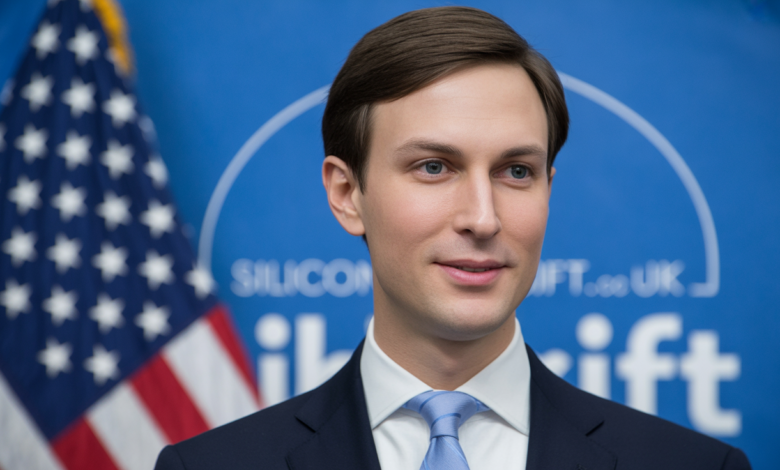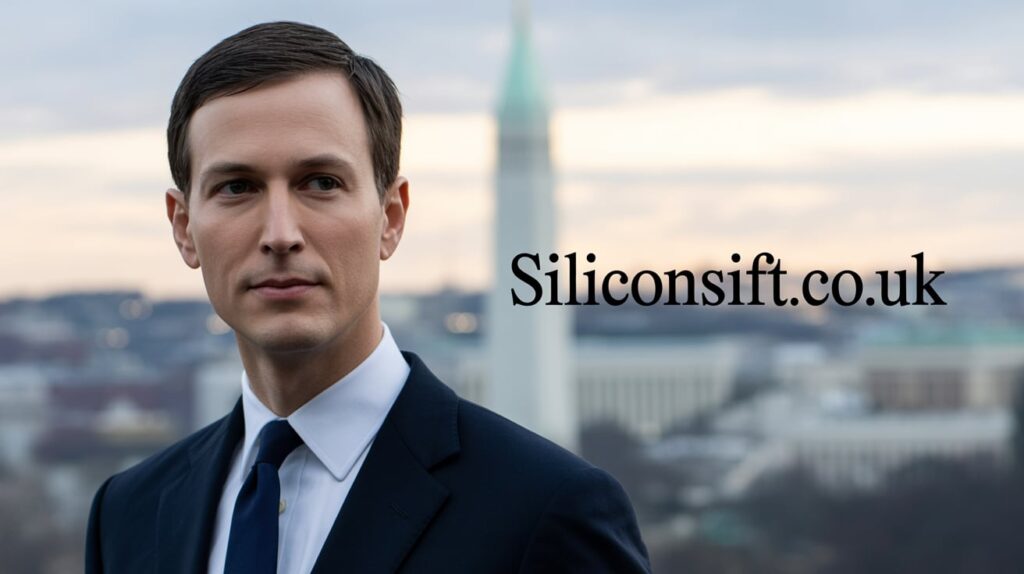Jared Kushner: Power, Influence, and Controversy

Introduction
When you think about Jared Kushner, the image that comes to mind is often complex. He is a businessman, investor, and political figure who stepped into the national spotlight during the Trump administration. For some, he represents quiet influence and behind the scenes decision making. For others, he symbolizes the blurred lines between business, politics, and personal networks.
If you live in the United States or follow global politics, you have probably heard his name linked to big real estate deals, Middle East negotiations, and the Trump White House. But who is Jared Kushner really, and how did he rise to such prominence? In this article, you will get a closer look at his background, his career, his role in politics, and the controversies that continue to follow him. We will also explore what lessons you can take away when thinking about influence, leadership, and public perception. By the end, you will have a clearer picture of Kushner’s story and what it means in the broader context of power today.
Early Life and Education
Jared Kushner was born in 1981 in New Jersey to Charles and Seryl Kushner. His father, Charles, was a real estate developer with a growing empire. From a young age, Jared was surrounded by business discussions, investments, and the importance of wealth management.
He attended Harvard University, a move that sparked debate years later about whether his admission was tied to merit or family influence. While at Harvard, Kushner studied government and showed an early interest in politics and finance. He later attended New York University where he earned dual degrees in law and business. This academic path set him up to continue in both law and real estate, eventually bridging those with political involvement.
For many people, the question is whether his success was due to his education, his family background, or a mix of both. The reality is that it was likely a combination. His upbringing gave him opportunities, and his education provided him with the tools to leverage them.
Real Estate Career
After school, Kushner stepped into the family business, Kushner Companies. This was not just about managing properties but about making bold acquisitions.
One of his biggest moves came in 2007 when Kushner Companies bought 666 Fifth Avenue in Manhattan for a record 1.8 billion dollars. The purchase was flashy and positioned Jared as a new face in New York real estate. However, the deal quickly faced challenges, especially after the financial crisis of 2008. The building became a financial burden, and critics pointed to the risks of overpaying.
Despite setbacks, Kushner continued to pursue deals. He diversified investments and pushed the company into both residential and commercial markets. His ability to recover from missteps became part of his reputation, though many critics argued that family wealth gave him safety nets others would not have.
For you as a reader, this story highlights something important. Risk is part of business, but the resources you start with can shape the outcomes of those risks.

Marriage and Connection to the Trump Family
In 2009, Jared Kushner married Ivanka Trump, daughter of Donald Trump. This union not only blended two wealthy families but also placed Jared directly into the Trump orbit.
The marriage elevated Kushner’s visibility. He was no longer just a real estate executive. He became part of a family that would soon enter the highest level of American politics. His role as Ivanka’s husband created a pathway into national conversations about policy, business, and global relations.
The connection to Donald Trump was pivotal. When Trump ran for president in 2016, Kushner played a behind the scenes role in strategy, data analytics, and digital campaigning. Many credit him with contributing to the campaign’s use of social media and targeted advertising, which became crucial in Trump’s victory.
Role in the Trump Administration
When Donald Trump became president in 2017, Jared Kushner was appointed as a senior advisor. This move was unusual because Kushner had no prior government experience. Critics raised concerns about nepotism, while supporters argued that his business skills could bring a fresh perspective.
His portfolio was broad. He was tasked with roles ranging from criminal justice reform to Middle East peace negotiations. Some argued this spread him too thin, while others saw it as evidence of Trump’s trust in him.
Among his most high profile efforts was the Abraham Accords. These agreements normalized relations between Israel and several Arab states, including the United Arab Emirates and Bahrain. For Kushner, this was a major diplomatic achievement and one of the administration’s key foreign policy successes.
At the same time, he faced criticism for his handling of the COVID 19 pandemic. Kushner was involved in managing supply chains and national response strategies, but reports suggested disorganization and lack of clear leadership.
The lesson here is that influence without experience can be both powerful and risky. When you step into high stakes roles, preparation and expertise matter as much as connections.
Business Ventures After the White House
After leaving Washington, Kushner returned to the business world. He founded Affinity Partners, a private equity firm with a focus on global investments. Reports linked funding sources to Saudi Arabia, which drew scrutiny about possible conflicts of interest.
Through Affinity Partners, Kushner aimed to build a new legacy beyond real estate. The firm sought to invest in sectors like technology and innovation. Critics, however, argued that his political connections made him a magnet for foreign capital in ways that blurred lines between business and diplomacy.
For you, this stage of his life shows how public service can open doors in business, but it can also invite more public scrutiny. Once someone has been in politics, every deal and partnership is seen through a different lens.
Influence and Leadership Style
Kushner is often described as quiet but influential. He rarely makes public speeches compared to other political figures. Instead, he works behind the scenes, shaping conversations and advising powerful leaders.
This leadership style has both strengths and weaknesses. On one hand, it allows him to avoid the spotlight and operate without constant media attention. On the other hand, it makes him appear unaccountable at times because his influence is harder to measure.
If you prefer a low profile but want to make an impact, Kushner’s approach might seem appealing. However, it also shows how important transparency is when you hold public power.
Controversies and Criticism
Jared Kushner’s career has been filled with controversies. Here are some of the main ones:
- Nepotism in government. Many believed his appointment as senior advisor was not earned through qualifications.
- Real estate deals. His purchase of 666 Fifth Avenue and later financial struggles became symbolic of risky business practices.
- Conflicts of interest. His ongoing business ties while serving in the White House raised ethical questions.
- Handling of COVID 19. Reports of disorganization damaged his reputation as an effective manager.
- Middle East funding. His private equity firm’s links to foreign governments added to concerns about influence and accountability.
These controversies reveal the tension between personal ambition and public responsibility. For you, the key takeaway is that public perception can make or break your legacy, regardless of achievements.
Legacy and Future Outlook
What will Jared Kushner be remembered for? For some, it will be the Abraham Accords and his role in reshaping Middle East diplomacy. For others, it will be the image of a political insider whose wealth and family connections allowed him to bypass traditional pathways.
His future is likely to stay tied to both business and politics. Whether he takes on a more direct role in future administrations or continues building his investment firm, his name will remain connected to power.

Conclusion
Jared Kushner is a figure who sparks strong reactions. He is a businessman turned political advisor, a husband to Ivanka Trump, and someone who has navigated the intersection of wealth, politics, and global influence. His story is about opportunity, risk, controversy, and achievement all woven together.
For you, the lesson is clear. Influence comes with responsibility. When you have access to power, how you use it matters, and how people perceive your actions can shape your legacy as much as the actions themselves.
So, what do you think? Should Kushner be remembered more for his diplomatic achievements or for the criticisms he faced? Your view shapes how history will remember him.
FAQs
1. Who is Jared Kushner?
He is a businessman, investor, and political advisor best known for his role as a senior advisor in the Trump administration.
2. What is Jared Kushner known for?
He is known for real estate investments, his marriage to Ivanka Trump, his role in the Trump campaign, and his work on the Abraham Accords.
3. What businesses does Jared Kushner own?
He was involved in Kushner Companies, a real estate firm, and later founded Affinity Partners, a private equity firm.
4. Did Jared Kushner help with Middle East peace?
Yes, he played a central role in the Abraham Accords, which normalized relations between Israel and several Arab countries.
5. Why is Jared Kushner controversial?
He has faced criticism for nepotism, conflicts of interest, business ties during his political service, and handling of the COVID 19 response.
6. What is his connection to Donald Trump?
He is married to Ivanka Trump and served as a senior advisor during Donald Trump’s presidency.
7. What education does Jared Kushner have?
He studied at Harvard University and earned law and business degrees from New York University.
8. What did he do after leaving the White House?
He launched Affinity Partners, a private equity firm focused on global investments.
9. Was Jared Kushner successful in real estate?
He had major deals, including the purchase of 666 Fifth Avenue, but also faced challenges and financial setbacks.
10. What is Jared Kushner’s leadership style?
He is known for being quiet and working behind the scenes, influencing decisions without always being in the spotlight.
Also Read Siliconsift.co.uk